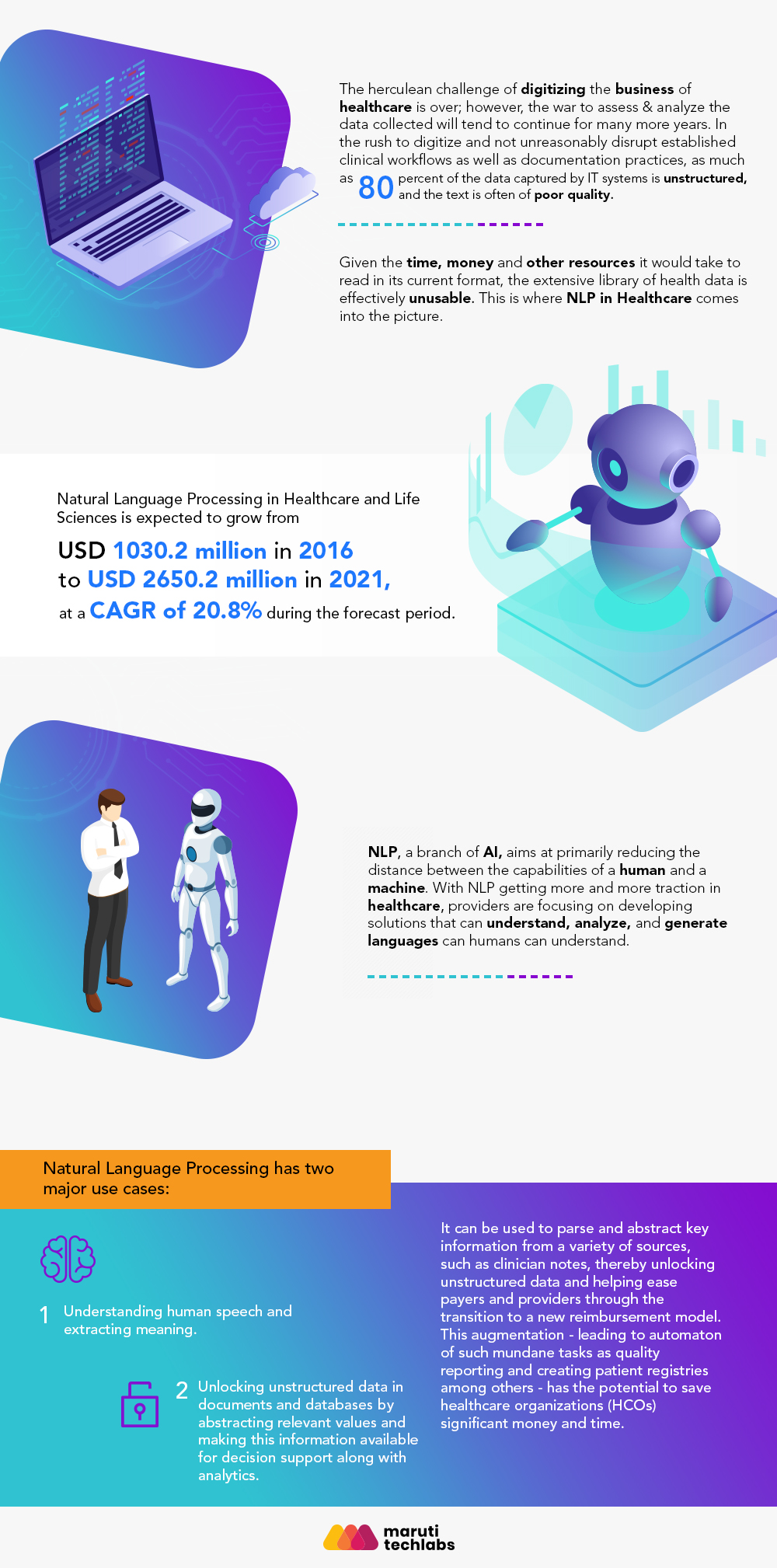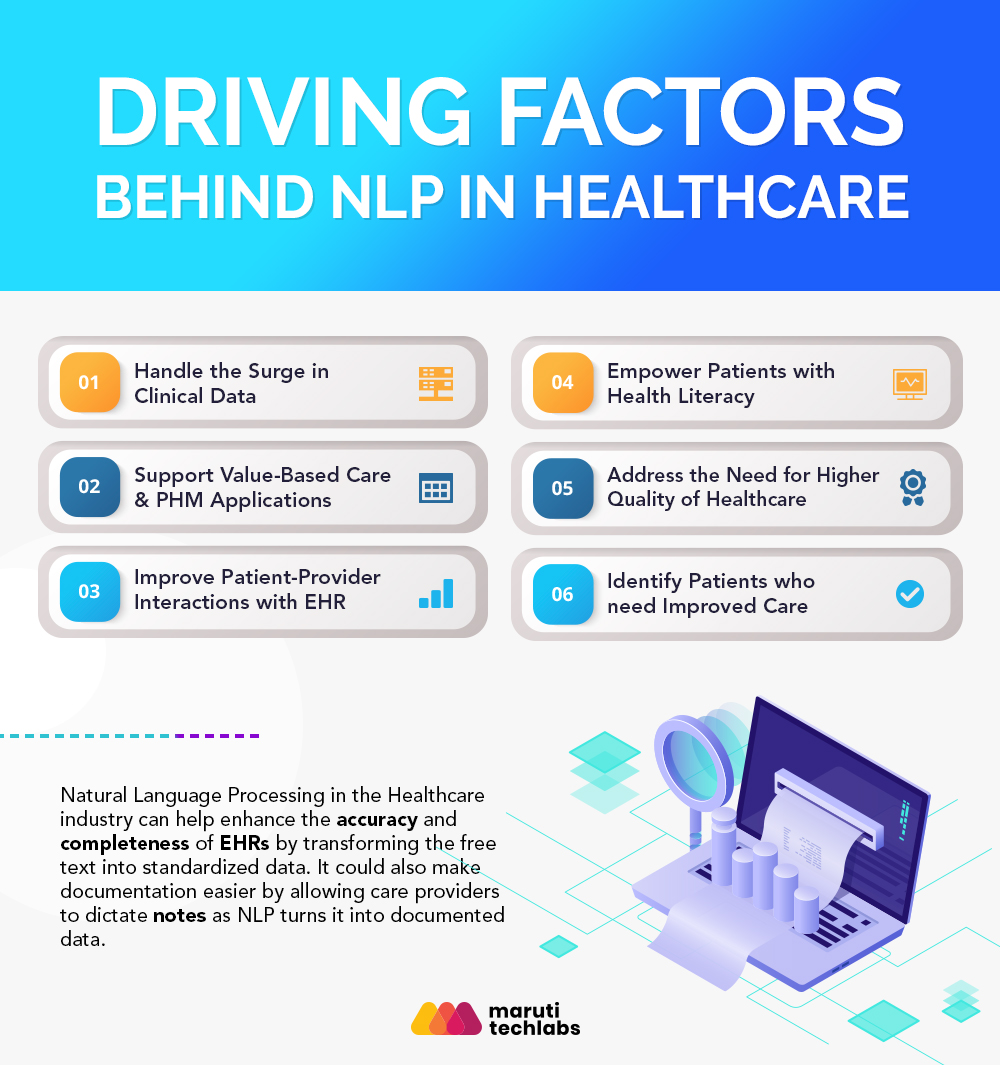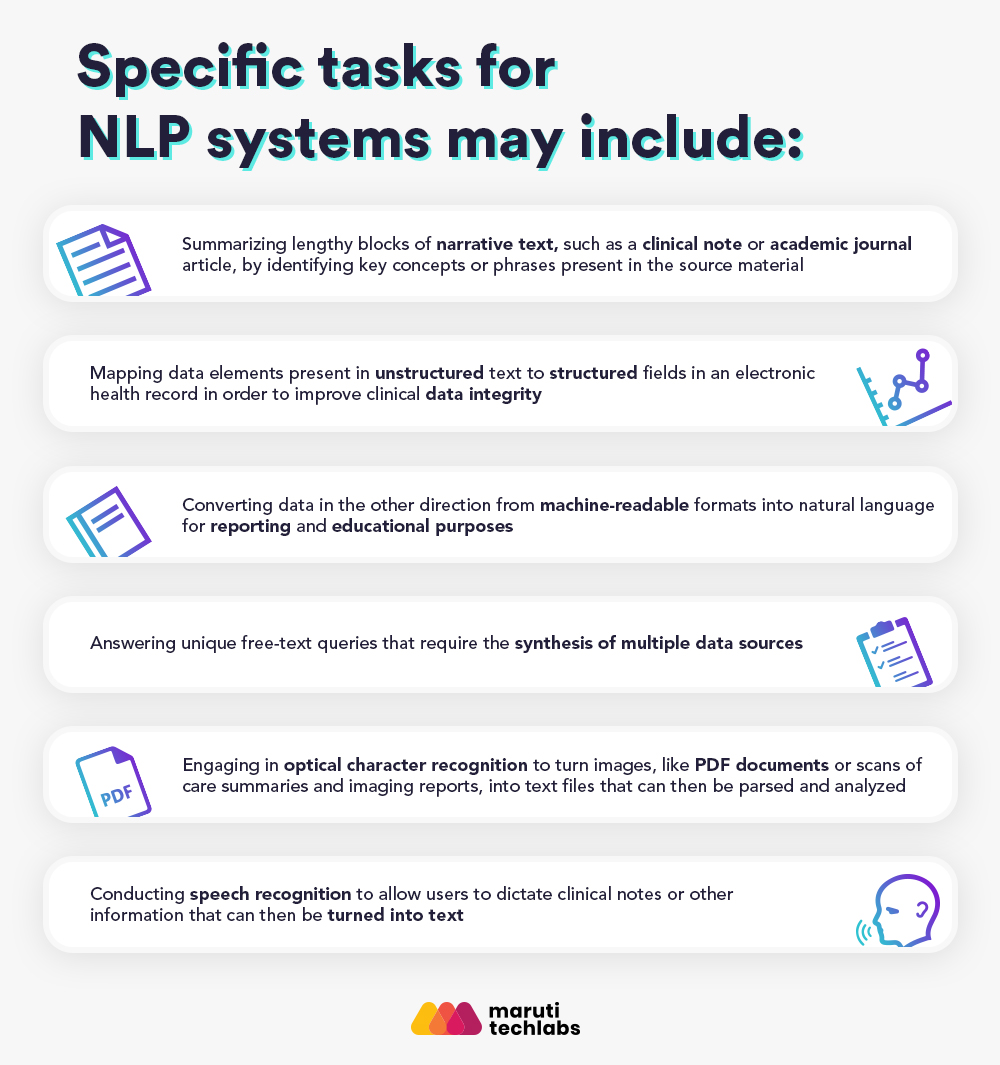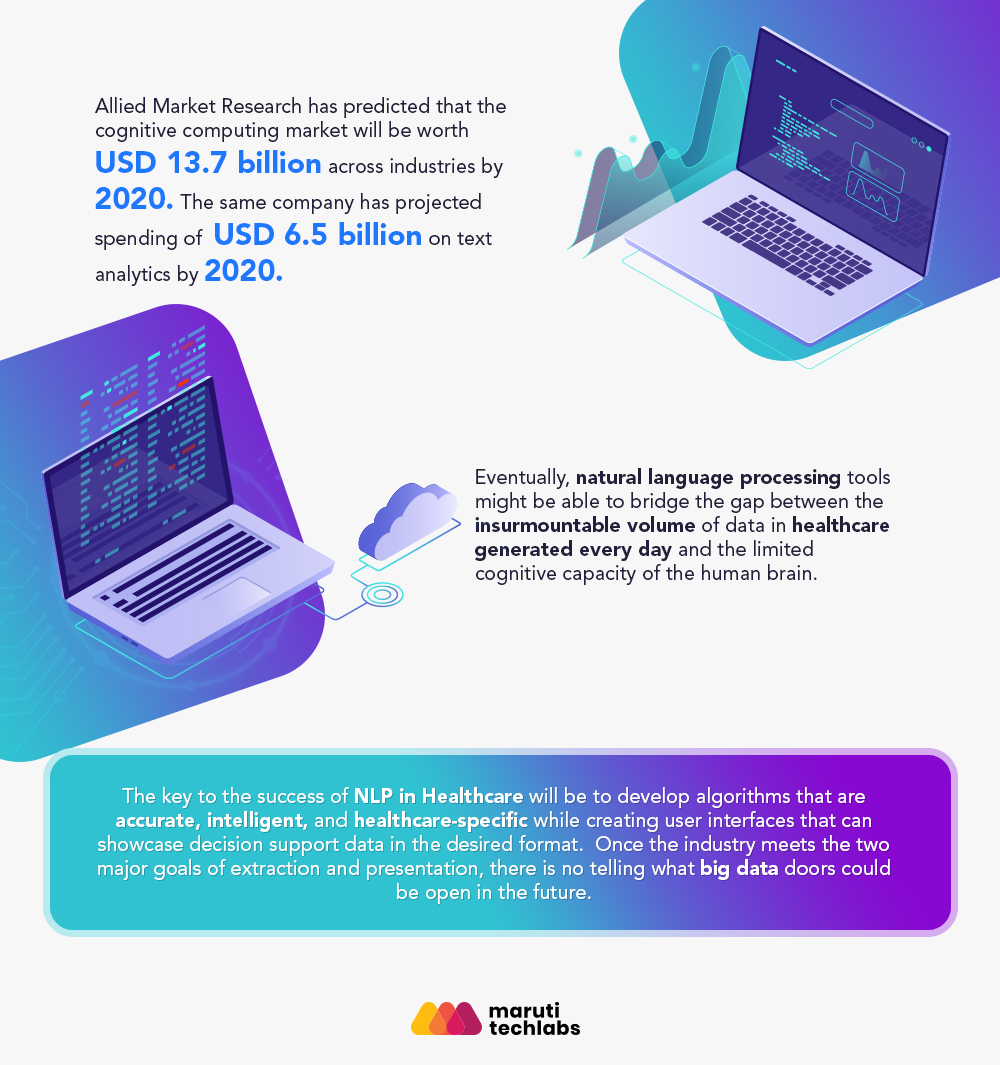

Unlocking the Power of NLP in Healthcare: A Comprehensive Review






The healthcare industry is fast realizing the importance of data, collecting information from EHRs, sensors, and other sources. However, the struggle to make sense of the data collected in the process might rage on for years. Since the healthcare system has started adopting cutting-edge technologies, there is a vast amount of data collected in silos. Healthcare organizations want to digitize processes, but not unnecessarily disrupt established clinical workflows. Therefore, we now have as much as 80 percent of data unstructured and of poor quality. This brings us to a pertinent challenge of data extraction and utilization in the healthcare space through NLP in Healthcare.
This data as it is today, and given the amount of time and effort it would need for humans to read and reformat it, is unusable. Thus, we cannot yet make effective decisions in healthcare through analytics because of the form our data is in. Therefore, there is a higher need to leverage this unstructured data as we shift from fee-for-service healthcare model to value-based care.
This is where Natural Language Processing, a subcategory of Artificial Intelligence can come in. NLP based chatbots already possess the capabilities of well and truly mimicking human behavior and executing a myriad of tasks. When it comes to implementing the same on a much larger use case, like a hospital – it can be used to parse information and extract critical strings of data, thereby offering an opportunity for us to leverage unstructured data.

This augmentation could save healthcare organizations precious money and time by automating quality reporting and creating patient registries. Let’s explore the factors driving NLP in Healthcare and its possible benefits to the industry.
Studies show that Natural Language Processing in Healthcare is expected to grow from USD 1030.2 million in 2016 to USD 2650.2 million in 2021, at a CAGR of 20.8 percent during the forecast period.
NLP, a branch of AI, aims at primarily reducing the distance between the capabilities of a human and a machine. As it beginning to get more and more traction in the healthcare space, providers are focusing on developing solutions that can understand, analyze, and generate languages can humans can understand.
There is a further need for voice recognition systems that can automatically respond to queries from patients and healthcare users. There are many more drivers of NLP in Healthcare as elucidated below –

The increased use of patient health record systems and the digital transformation of medicine has led to a spike in the volume of data available with healthcare organizations. The need to make sense out of this data and draw credible insights happens to be a major driver.
The shift in business models and outcome expectations is driving the need for better use of unstructured data. Traditional health information systems have been focusing on deriving value from the 20 percent of healthcare data that comes in structured formats through clinical channels.
For advanced patient health record systems, managed care, PHM applications, and analytics and reporting, there is an urgent need to tap into the reservoir of unstructured information that is only getting piled up with healthcare organizations.
NLP in Healthcare could solve these challenges through a number of use cases. Let’s explore a couple of them:
Patients in this day and age need undivided attention from their healthcare providers. This leaves doctors feeling overwhelmed and burned out as they have to offer personalized services while also managing burdensome documentation including billing services.
Studies have shown how a majority of care professionals experience burnout at their workplaces. Integrating NLP with electronic health record systems will help take off workload from doctors and make analysis easier. Already, virtual assistants such as Siri, Cortana, and Alexa have made it into healthcare organizations, working as administrative aids, helping with customer service tasks and help desk responsibilities.
Soon, NLP in Healthcare might make virtual assistants cross over to the clinical side of the healthcare industry as ordering assistants or medical scribes.
With conversational AI already being a success within the healthcare space, a key use-case and benefit of implementing this technology is the ability to help patients understand their symptoms and gain more knowledge about their conditions. By becoming more aware of their health conditions, patients can make informed decisions, and keep their health on track by interacting with an intelligent helathcare chatbot.
In a 2017 study, researchers used NLP solutions to match clinical terms from their documents with their layman language counterparts. By doing so, they aimed to improve patient EHR understanding and the patient portal experience. Natural Language Processing in healthcare could boost patients’ understanding of EHR portals, opening up opportunities to make them more aware of their health.
NLP can be the front-runner in assessing and improving the quality of healthcare by measuring physician performance and identifying gaps in care delivery.
Research has shown that artificial intelligence in healthcare can ease the process of physician assessment and automate patient diagnosis, reducing the time and human effort needed in carrying out routine tasks such as patient diagnosis. NLP in healthcare can also identify and mitigate potential errors in care delivery. A study showed that NLP could also be utilized in measuring the quality of healthcare and monitor adherence to clinical guidelines.
Machine Learning and NLP tools have the capabilities needed to detect patients with complex health conditions who have a history of mental health or substance abuse and need improved care. Factors such as food insecurity and housing instability can deter the treatment protocols, thereby compelling these patients to incur more cost in their lifetime.
The data of a patient’s social status and demography is often hard to locate than their clinical information since it is usually in an unstructured format. NLP can help solve this problem. NLP can also be used to improve care coordination with patients who have behavioral health conditions. Both, Natural Language Processing & Machine Learning can be utilized to mine patient data and detect those that are at risk of falling through any gaps in the healthcare system.
Since the healthcare industry generates both structured and unstructured data, it is crucial for healthcare organizations to refine both before implementing NLP in healthcare.
Natural Language Processing in the healthcare industry can help enhance the accuracy and completeness of EHRs by transforming the free text into standardized data. This could also make documentation easier by allowing care providers to dictate notes as NLP turns it into documented data.

Computer-aided coding is another excellent benefit of NLP in healthcare. It can be viewed as a silver bullet for the issues of adding significant detail and introducing specificity in clinical documentation. For providers in need of a point-of-care solution for highly complex patient issues, NLP can be used for decision support. An often-quoted example and an epitome of NLP in healthcare is IBM Watson. It has a massive appetite for academic literature and growing expertise in clinical decision support for precision medicine and cancer care. In 2014, IBM Watson was used to investigating how NLP and Machine Learning could be used to flag patients with heart diseases and help clinicians take the first step in care delivery.
Natural Language Processing algorithms were applied to patient data and several risk factors were automatically detected from the notes in the medical records. Since there is this explosion of data in healthcare which pertains not only to genomes but everything else, the industry needs to find the best way to extract relevant information from it and bring it together to help clinicians base their decisions on facts and insights.
Developing, testing, and deploying NLP-based solutions can prove to be a cumbersome task and might need external assistance from a Natural Language Processing services and solutions company.
NLP in Healthcare is still not up to snuff, but the industry is willing to put in the effort to make advancements. Semantic big data analytics and cognitive computing projects, which have foundations in NLP, are seeing significant investments in healthcare from some recognizable players.

Allied Market Research has predicted that the cognitive computing market will be worth USD 13.7 billion across industries by 2020. The same company has projected spending of USD 6.5 billion on text analytics by 2020. Eventually, natural language processing tools might be able to bridge the gap between the insurmountable volume of data in healthcare generated every day and the limited cognitive capacity of the human brain.
The technology has found applications in healthcare ranging from the most cutting-edge solutions in precision medicine applications to the NLP contract management analysis and coding a claim for reimbursement or billing. The technology has far and wide implications on the healthcare industry, should it be brought to fruition. However, the key to the success of introducing this technology will be to develop algorithms that are intelligent, accurate, and specific to ground-level issues in the industry. NLP will have to meet the dual goals of data extraction and data presentation so that patients can have an accurate record of their health in terms they can understand. If that happens, there are no bars to the improvement in physical efficiency we will witness within the healthcare space.
At Maruti Techlabs, we are truly committed to transforming the healthcare space by building solutions like contextual AI assistants as we realize that conversations with patients or internally at hospitals are rarely just one question and answer. Our chatbot solutions and NLP models have helped leading hospitals within India and abroad, overhaul their patient and staff experience through use cases like automation of appointment booking, feedback collection, optimization of internal process like medical coding and data assessment as well as data entry. It has been truly exhilarating for us to see our clients & partners go live with their chatbots and AI based models, enhance & train over time, and meet their organizational goals.


